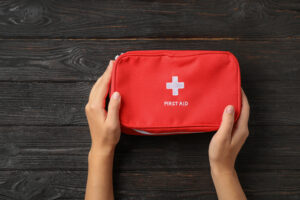5 Things to Know About Your First Aid Kit

As part of our organization’s mission, REMSA Health believes that educating the public in emergency response, such as CPR and first aid training, plays a crucial role in saving lives. First aid kits are important in an emergency as they reduce the risk of minor injuries from worsening. First aid training also gives people confidence to assist with an accident or injury to help alleviate or stabilize the situation. This year, in partnership with the Washoe County Health District, REMSA Health is offering free first aid kits to community organizations and organized groups such as youth and adult sports leagues.
Before your next group outing or event, consider if you are properly prepared in case of an emergency. Do a brief review of your first aid kit. Here’s a quick checklist to ensure you have everything you need.
- What’s in your first aid kit, and what needs to be added? Some necessary items include but are not limited to the following: an Epipen (Rx only) or Benadryl, a CPR mask/ breathing barrier, non-latex gloves, scissors, a thermometer, sterile water, a splint, a whistle, antibiotic ointment, tweezers, gauze, bandages of various sizes, antiseptic wipes, first aid guide or first aid app, a cold compress, paper and permanent marker, pain relievers, a small pocket knife, a tourniquet, and sunblock.
- Just because you’ve never experienced an emergency doesn’t mean it won’t happen. Here are some emergencies to consider when packing your first aid kit:
- Sprains/Strains/Fractures
- Cuts, abrasions, and puncture wounds
- Allergic reactions, dehydration, and insect bites
- Minor burns and blisters
- Is your next sporting event going to be out of state? Here’s a list of important items to bring with you or place in your first aid kit before you go:
- Extra medication for several days
- Emergency phone numbers
- A list of your medications
- Here are some necessary factors to consider when thinking about your location:
- How close is the nearest hospital?
- Will your cell phone work if you’re in the backcountry?
- Is there a ranger station, campground office, or lifeguard nearby?
- Your first aid kit is an important asset in the event of a small emergency however if a major emergency occurs keep this in consideration:
- Call 9-1-1 or send someone to call 9-1-1
- Remember the ABCs of treating emergencies:
- Airways: Check for clear airways
- Breathing: Is the subject breathing?
- Circulation: does the person have a pulse? Is there uncontrolled bleeding?
- For a broken bone:
- If the person appears to have a broken bone, have them or someone else support the break with their hand or a cushion.
- Attempt to stop major bleeding:
- Pack the wound with gauze
- Medical professionals will ultimately determine if a tourniquet is needed however when in doubt apply a tourniquet.
As always, be sure to enjoy your time with others but remember to be safe. Before your next big adventure check your first aid kit and ensure you have the right items in the event of an emergency.
Email info@remsa-cf.com for arrangements to pick up first aid kits for your sports league or community group.
